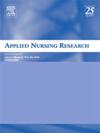Exploring nurses perceived self-efficacy and mental health competency for enhancing psychiatric care delivery in non-psychiatric settings
IF 2.7
4区 医学
Q1 NURSING
引用次数: 0
Abstract
Background
Nursing care is essential for providing high-quality, safe, and person-centered care, particularly for patients with mental health diagnoses. Mental illness poses significant global health challenges, and nurses often encounter difficulties in delivering care due to negative attitudes, poor mental health literacy, and fear, especially in non-psychiatric settings.
Objective
This study aims to investigate the perceived self-efficacy and mental health competency among nurses delivering psychiatric care in non-psychiatric settings.
Methods
A quantitative descriptive-cross-sectional design was employed. The study involved nurses from various non-psychiatric hospital settings, selected through convenience sampling to ensure a diverse representation in terms of experience, educational background, and exposure to psychiatric care. Participants' perceived competencies were assessed using the Behavioral Health Care Competency (BHCC) survey, while self-efficacy was measured using the Nursing Professional Self-Efficacy Scale—Version 2 (NPSES2).
Data analysis
Statistical analysis conducted using SPSS version 26, focusing on descriptive and inferential statistics at a significance level of p < 0.05 (two-tailed).
Result
Among 280 nurses, significant differences were found in nurse-perceived BHCC and NPSE based on training, with a notable correlation between perceived BHCC and NPSES, while sociodemographic factors like sex and education showed no significant impact.
Conclusion
The research suggests the need for educational and training programs for non-psychiatric nurses to address the gap in patient care. Extensive training and education equip nurses to deliver optimal care and compassion for patients with psychiatric demands.
探讨护士自我效能感和心理健康能力对提高非精神科护理服务的作用
护理对于提供高质量、安全和以人为本的护理是必不可少的,特别是对于患有精神健康诊断的患者。精神疾病构成了重大的全球卫生挑战,由于消极态度、精神卫生知识贫乏和恐惧,特别是在非精神科环境中,护士在提供护理方面经常遇到困难。目的探讨非精神科护理护士的自我效能感和心理健康能力。方法采用定量描述性横断面设计。本研究涉及来自不同非精神病医院的护士,通过方便抽样选择,以确保在经验、教育背景和接触精神科护理方面具有多样化的代表性。参与者的感知胜任力采用行为健康护理胜任力(BHCC)量表进行评估,自我效能感采用护理专业自我效能量表-第2版(NPSES2)进行测量。数据分析使用SPSS 26版本进行统计分析,重点是在p <的显著性水平上进行描述性和推断性统计;0.05(双尾)。结果280名护士中,基于培训的护士感知BHCC和NPSE存在显著差异,感知BHCC与NPSE之间存在显著相关,性别、受教育程度等社会人口因素对其无显著影响。结论对非精神科护士进行教育和培训,以解决病人护理方面的差距。广泛的培训和教育使护士能够为有精神需求的病人提供最佳的护理和同情。
本文章由计算机程序翻译,如有差异,请以英文原文为准。
求助全文
约1分钟内获得全文
求助全文
来源期刊

Applied Nursing Research
医学-护理
CiteScore
4.50
自引率
0.00%
发文量
65
审稿时长
70 days
期刊介绍:
Applied Nursing Research presents original, peer-reviewed research findings clearly and directly for clinical applications in all nursing specialties. Regular features include "Ask the Experts," research briefs, clinical methods, book reviews, news and announcements, and an editorial section. Applied Nursing Research covers such areas as pain management, patient education, discharge planning, nursing diagnosis, job stress in nursing, nursing influence on length of hospital stay, and nurse/physician collaboration.
 求助内容:
求助内容: 应助结果提醒方式:
应助结果提醒方式:


